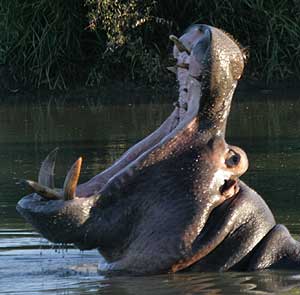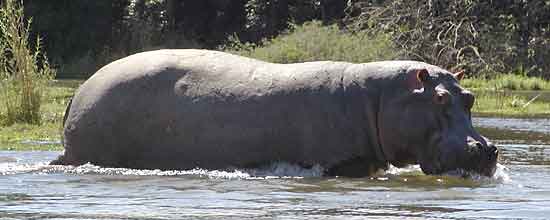Contact Details: Scotch Macaskill, Dirt Road Traders, Currys Post Road, Howick, KwaZulu-Natal, South Africa. Tel: +27 (0)82 578 2329. Privacy: Your privacy is guaranteed. See our Privacy Policy for more. This site accepts advertising and other forms of compensation - see Disclosure and Advertising for details. Site updated: 2022. Copyright © 2002 - 2022 Scotch Macaskill

| ||||||||||
|
||||||||||
|
SEE ALL
|
Hippos - is their Bad Reputation Deserved?by Roddy SmithIn Southern Africa we rightly regard the bush and wildlife as our birthright, and we like to think that we are fairly knowledgeable about them. Unfortunately much of the "bush-lore" which we grow up accepting as fact is full of myths and misconceptions which have been passed down over the years. Everybody knows that "hippos kill more people than any other animal in Africa". This is a belief so generally accepted that it is quoted (from Kingdon) in no less an authority than The Mammals of the Southern African Sub-region, but I can find no statistics to back this and, based on my own observations during almost 20 years in the Lower Zambezi valley, one of the world's great hippo strongholds, I believe it to be nonsense.
Hippos are much-maligned animals. They are large wild animals with fearsome equipment, so obviously they are potentially dangerous if they feel themselves to be under immediate threat, but they are not inherently aggressive. In areas where they are not harassed hippos are surprisingly tolerant animals; given an escape route they will almost always move out of one's way . Over the last 20 years only a handful of individuals out of about six to eight thousand hippos between Rukomechi and the Mupata Gorge have been habitually aggressive, and those few became notorious precisely because their attitude was so different to the norm. Most hippo "incidents" come about because sleeping hippos have been surprised at close range, and more often than not "charging" hippos are just trying to get to deeper water. Genuine charges do occasionally happen, but usually because the hippo has nowhere to retreat to (classic "fight or flight" behaviour) and they can almost always be stopped by slapping a paddle on the water. Like other animals their attitude can vary as a result of experience - in areas where they are frequently hunted or harassed they may be more prone to defensive behaviour. In the course of several hundred canoe trips I have had both opportunity and incentive to observe and learn about hippos; as with all aspects of learning about the bush this is an endlessly continuing process, but I believe I understand them better now than I did when I started.
I have had my share of "encounters", mostly in my earlier years: I have had hippos come up under canoes, I have had one bump me with his muzzle as he ran past, and I have been bitten by one. All these episodes had two things in common: I was in the wrong place, and in every case the hippo was more interested in escaping than inflicting damage. Hippos are essentially nocturnal animals, resting during the day. Although they like to bask on the bank in areas where they are not disturbed they cannot do so for too long and spend most of the day in the water, where they walk on the bottom rather than swim. They like to rest in shallow water where they can breathe without having to move; sometimes they sleep submerged, reflexively lifting their heads just enough to take a breath. This is the most common cause of hippo "incidents", when people canoe over a sleeping animal, and the best way to avoid it is never to drift. Hippos communicate under water as well as above and they can hear disturbances such as paddle movements. When a potential threat approaches they like to move to deeper water where they can submerge and conceal themselves.
If the channel is too small for security they will often get out and move away, but where they are used to canoes one can pass within metres of them in small channels.
Unfortunately many people's attitude (including some guides) is based on fear and ignorance, leading them to hug the bank and bang their canoes which only makes hippos scared and agitated and therefore more dangerous. When passing hippos you should give them space wherever possible; in smaller channels make sure they are aware of your approach well in advance, assess which way they will move and take the other side. Keep moving slowly, quietly and steadily; as with most animals your attitude communicates itself. If a hippo seems undecided, help him make up his mind by making it obvious which way you are going and continuing to move. I have found that if you stop to see what he will do, he will wait to see what you do, and a confusing stand-off results. As with most animals, it is not possible lay down hard and fast rules. It all comes down to assessing the situation in the light of experience. For more about hippos, see Hippo Information. Roddy Smith is a wildlife conservationist and safari guide based at Mwambashi River Lodge in the Lower Zambezi National Park, Zambia. Images © Scotch Macaskill Return to Wildlife Articles |
|||||||||
|
|
||||||||||


